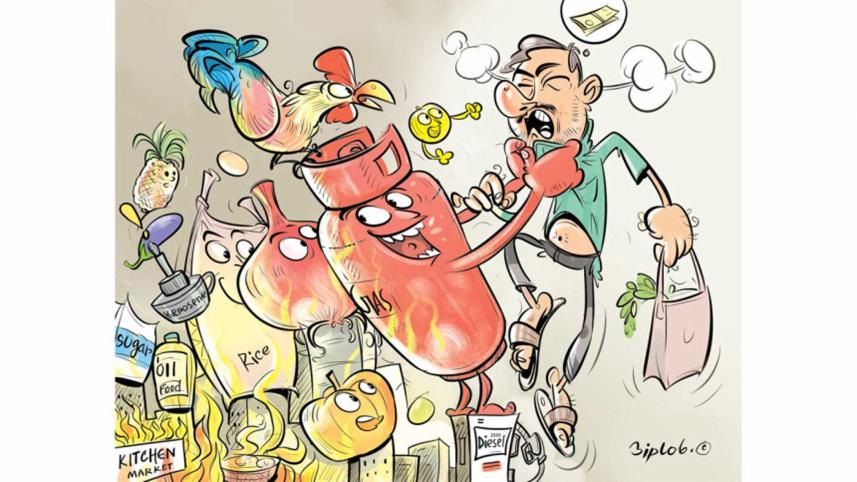Why Bangladesh should worry about its economy

Given the gloomy global macro-economic outlook, Finance Minister AHM Mustafa Kamal's assessment that Bangladesh's macroeconomic stability is not at risk over the Russia-Ukraine crisis is questionable. Increased prices of cereal grains, agricultural inputs (e.g., fertiliser cost), fuel cost, devaluation of the taka, combined with high transportation cost will exert tremendous pressure on the country's food security. A food crisis is on the horizon even if the crisis gets sorted soon. Special attention and relevant actions are needed from the concerned authorities to soften the impact.
Bangladesh is already struggling with the widening income gap which was worsened by the Covid-led inflationary trap. Issues in the international market combined with the Ukraine crisis will put further strain on domestic prices. Price of grain and multiple household items have skyrocketed in the international market. For example, price of wheat, which accounts for over 10 percent of the daily calorie intake in Bangladesh, is significantly higher compared to last year. The country's annual demand for wheat, which is growing 10 percent per annum, stands at around 77 lakh tonnes, 85 percent of which is met through imports, as per the National Board of Revenue (NBR). However, wheat production worldwide has declined due to the pandemic and unfavourable weather.
In addition, both Russia and Ukraine missed the current sowing season which will impact wheat supply and prices even next year and beyond. Bangladesh imports almost half its wheat from Ukraine and Russia. Data on Bangladesh from the Food and Agriculture Organisation (FAO) shows that consumers had to pay Tk 34 to buy one kilogramme of flour in November in Dhaka, which was 19 percent higher from Tk 28.69 a year ago. Like wheat, price of barley, corn and edible oil could hit all-time highs.
Increased fertiliser cost will also seriously affect global prices of other essential crops like rice., vegetables, etc. To produce a variety of crops, Bangladesh uses over 50 lakh tonnes of chemical fertilisers annually, three-fourths of which is imported. Russia and Belarus are big exporters of fertilisers and their raw materials account for 37 percent of potash, 32 percent of ammonia and 14 percent of the world's urea market. In January 2022, the international price of a range of key fertiliser ingredients shot through the roof. Since January 2021, the price of ammonia has gone up by 220 percent, urea by 148 percent, di-ammonium phosphate by 90 percent, and potassium chloride by 198 percent.
Currently, the government provides Tk 10-20 subsidy for each kilogramme of fertiliser. Given the price of fertilisers in the international market, to lessen inflation, the government will need to at least double its subsidy for fertilisers in the next financial year.
Freight cost is also at a record high. According to the Freights Baltic Index, while global spot rates for 40-foot containers have declined from their peak in September, they are still running at USD 9,604, more than double from a year earlier. And with oil price rising over USD 100/barrel, it is unlikely to go down any time soon.
Depreciation of the taka will also push up import costs. An import dependent country like Bangladesh needs to be careful in depreciating its currency to avoid further inflation.
Widening income gap has always been a critical issue in Bangladesh, and it has gotten worse in recent times. The South Asian Network on Economic Modelling (SANEM) shows that the percentage of Bangladeshis living below the poverty line (upper poverty line) has nearly doubled from 21.6 percent in 2018 to 42 percent in 2020, while the percentage of extreme poor (lower poverty line) tripled from 9.4 percent in 2018 to 28.5 percent in 2020. Increased inflationary pressure will push more people below the poverty line which might lead to social unrest. In its latest assessment on Bangladesh, Moody's assessed that Bangladesh's exposure to social risks is very high because of poverty, inequality, unemployment, and inflation.
Even though Bangladesh can't do much about the rising price level in the international market, the country needs to focus on internal supply chains. Actions like active market surveillance, targeted subsidies, reducing extortions on roads and highways and deploying more TCB trucks with essential products are urgently needed for the near future.
AFM Mainul Ahsan, PhD, Analyst, Department of Transport, Victoria, Australia. Email: mainul188@gmail.com



 For all latest news, follow The Daily Star's Google News channel.
For all latest news, follow The Daily Star's Google News channel.
Comments